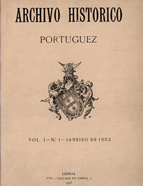

................................
A general observation of the journal’s contents shows that the publication of sources constituted the bulk of the contributions, thus assuming the logic of an “archive”. This fact was symptomatically reinforced a few years after the first issue by the journal’s administrator, Fernando Brederode: “ Archivo Historico is not a journal for leisurely reading in your spare time; that is not its nature, and it has remained so. It should mainly be, and has been, a repository of reliable sources for the study of national history” (AHP, vol. IV, p. V). In addition, the Archivo ’s universe of contributors was relatively extensive and included important figures from the cultural and historiographical milieu of the time. In addition to those already mentioned, we find, for example, Maximiano Lemos, Sousa Viterbo, Júlio Castilho, Vitor Ribeiro and foreign figures such as Edgar Prestage and J. Denucè. It should be noted that this group included the collaboration of a woman, Carolina Michaëlis de Vasconcelos.
The diverse universe of contributors allowed for a wide range of topics to be covered in the Archivo . There is a clear focus on the period of Expansion and Discovery, with a significant number of contributions, many of which are by Pedro de Azevedo, A. Braamcamp Freire and Sousa Viterbo, with more than 30 titles each (Maria Sidónia Tavares, Descobrimentos e navegações no Archivo Historico Portuguez , p. 26). Other topics that were little developed by Portuguese historiography at the time were given space in the pages of the Archivo . These include, for example, studies of an economic but also technological nature, such as Victor Ribeiro’s “Artes e Indústrias em Portugal no século XVIII” [Arts and Industries in Portugal in the 18 th century] (vol. IX, 1914); the ongoing study of the Inquisition by António Baião, “A Inquisição em Portugal e no Brasil” [The Inquisition in Portugal and Brazil] (vol. V, 1907 and vol. VI, 1908); the interesting study by Pedro A. de Azevedo, “Os ciganos em Portugal no séc. XVI e XVII” [Gypsies in Portugal in the 16 th and 17 th centuries] (vol. VII, 1909); and an interesting study on “feminism” by A. Costa Lobo, “Um campeão do feminismo no século XV” [A Champion of Feminism in the 15 th century] (vol. II, 1904). Equally important is the stimulating work by João Lúcio de Azevedo on Sebastianism, published in 1918, but already well developed in the pages of the Archivo , “ A evolução do sebastianismo” [The evolution of Sebastianism] (vol. X, 1916). The trend towards specialisation, with the systematic treatment of specific topics, was thus evident in the Archivo (J.A. Mendes, “Revistas de História”, p. 213). Also revealing of this historiographical dynamic was the choice of biographical studies, clearly evident in the journal, with diverse examples such as those by Francisco Leitão Ferreira, “Notícias da Vida de André de Resende” [News from the Life of André de Resende] (vol. III and IX) or by Edgar Prestage, “D. Francisco Manuel de Mello. Documentos biográficos” [D. Francisco Manuel de Mello. Biographical Documents] (vol. VII, 1909).
This work is financed by national funds through FCT - Foundation for Science and Technology, I.P, in the scope of the projects UIDB/04311/2020 and UIDP/04311/2020.
